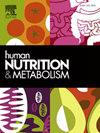Gut health-promoting foods intake in Argentine adults: The impact of knowledge, socio-demographic factors, and clinical-nutritional health
IF 1.8
Q3 ENDOCRINOLOGY & METABOLISM
引用次数: 0
Abstract
Background
The increasing acceptance of gut health-promoting foods emphasizes the need of understanding which factors influence their consumption. This study aimed to investigate the population's knowledge about probiotics, prebiotics, and fermented foods, and how this impacts their intake, considering socio-demographic factors and clinical-nutritional health.
Methods
A cross-sectional study was conducted on 2128 Argentine adults aged 18-82 years-old. An online questionnaire was used to collect socio-demographic, clinical-nutrition and dietary data, as well as information about population's knowledge. Logistic regression models were used for analysis.
Results
Fermented foods and probiotic-rich yogurts were consumed occasionally, while prebiotic food intake was more frequent. Yogurt with L.casei and bifidobacterium, onions and olives were the most popular foods, while kefir was the most discontinued food. More than sixty percent participants answered >50 % of knowledge-based questions correctly. However, a significant proportion of people were not aware of prebiotics’ definition and their dietary source. A suitable knowledge was associated with increased chances of consuming probiotic nutraceuticals and fermented foods. Female gender, age, being in a couple, recent antibiotic use, a history of medical conditions associated with higher probiotic nutraceuticals intake, and overweight were associated with a lower intake likelihood. A mixed diet showed opposite results on probiotic yogurts and fermented foods consumption.
Conclusion
Findings reveal a low frequency of gut health-promoting foods consumption, particularly sources rich in probiotics. Interventions aimed at increasing public awareness, as well as promoting a healthier diet and nutritional status, could be effective in boosting consumption of fermented foods and probiotics.

阿根廷成年人肠道健康促进食物摄入:知识、社会人口因素和临床营养健康的影响
对促进肠道健康的食物的接受度越来越高,这强调了了解影响其消费的因素的必要性。本研究旨在调查人群对益生菌、益生元和发酵食品的知识,以及这些知识如何影响他们的摄入,考虑到社会人口因素和临床营养健康。方法对2128名18 ~ 82岁的阿根廷成年人进行横断面研究。使用在线问卷收集社会人口学、临床营养和饮食数据,以及有关人口知识的信息。采用Logistic回归模型进行分析。结果发酵食品和富含益生菌的酸奶偶尔食用,而益生元食物的摄入更为频繁。含有干酪乳杆菌和双歧杆菌的酸奶、洋葱和橄榄是最受欢迎的食物,而开菲尔是最不受欢迎的食物。超过60%的参与者正确回答了50%的知识型问题。然而,很大一部分人不知道益生元的定义和它们的饮食来源。适当的知识与食用益生菌营养食品和发酵食品的机会增加有关。女性性别、年龄、夫妻关系、最近使用抗生素、与益生菌营养保健品摄入较多相关的病史以及超重与摄入益生菌的可能性较低相关。混合饮食对益生菌酸奶和发酵食品的摄入显示出相反的结果。结论:研究结果显示,促进肠道健康的食物消费频率较低,特别是富含益生菌的食物。旨在提高公众意识以及促进更健康的饮食和营养状况的干预措施,可以有效地促进发酵食品和益生菌的消费。
本文章由计算机程序翻译,如有差异,请以英文原文为准。
求助全文
约1分钟内获得全文
求助全文
来源期刊

Human Nutrition and Metabolism
Agricultural and Biological Sciences-Food Science
CiteScore
1.50
自引率
0.00%
发文量
30
审稿时长
188 days
 求助内容:
求助内容: 应助结果提醒方式:
应助结果提醒方式:


